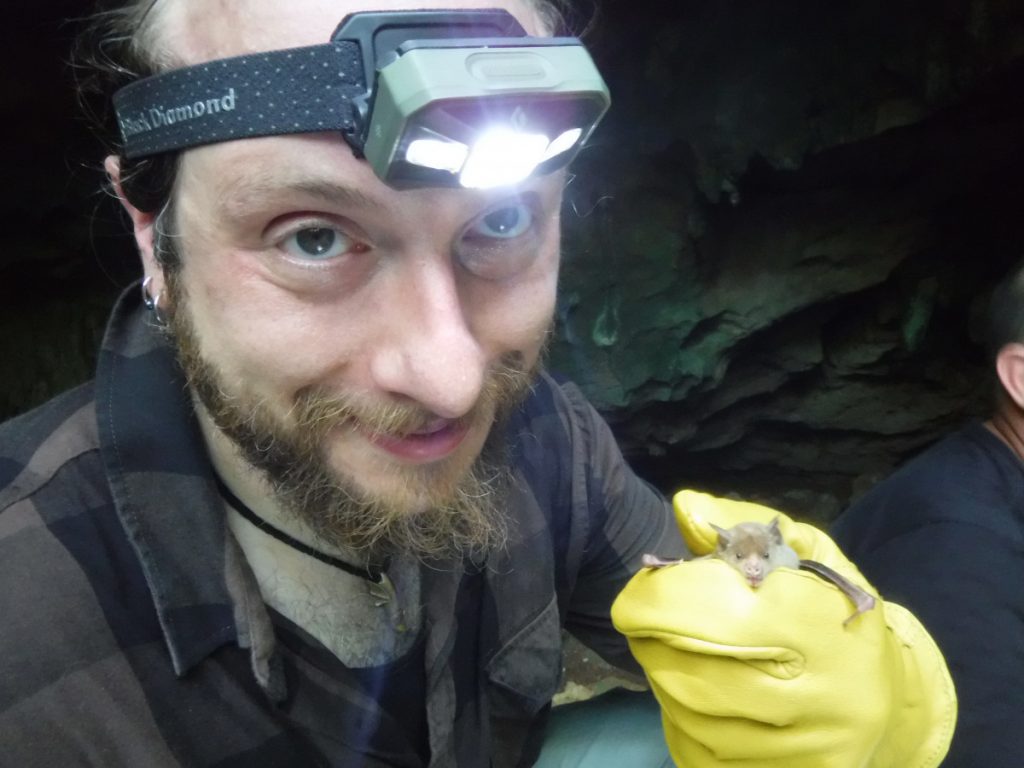During the day, the grounds are replete with rich wildlife and vegetation for all to enjoy; yet, some of Chautauqua’s wildlife only comes out at night, when most cannot see them with the naked eye.
At 8:30 p.m. Tuesday, Aug. 2 at Smith Wilkes Hall, bat biologist Jonathan Townsend will take Chautauquans on a bat-hunting adventure using echolocation tools and his knowledge of local bats.
Continuing the Bird, Tree & Garden Club’s special series of nighttime events, the “Tracking the Bat Population at CHQ” lecture fits well into Week Six’s theme, “After Dark: The World of Nighttime.”
Townsend holds a bachelor’s in environmental science and a master’s in biology from SUNY Fredonia. He is the manager of conservation and restoration at the Roger Tory Peterson Institute of Natural History, co-owner of the Royal Fern Nursery, and a research assistant with the University of Buffalo. Now working toward his doctorate in geography, Townsend studies the effects of plastic pollution on bats and insects here on the grounds.

Chautauqua’s history and bat population lured Townsend to conduct his doctoral studies here. The Institution once enjoyed one of the biggest populations of little brown bats in the country, prior to the early 2000s when white-nose syndrome plagued the species. White-nose syndrome is a disease that infects bats with a white fungus that clings to their ears, skin and wings during the winter months. The illness wiped out a majority of northeastern bat populations, including the ones at Chautauqua.
“Little brown bat populations have fallen 90 to 99% due to this illness, but this species persists in Western New York, including at the Institution, based on some of the bioacoustic surveys conducted there,” Townsend said. “The Institution’s history with bats makes it even more important to learn about and cherish the bat populations that are found there.”
Townsend will bring his expertise in bats to his nighttime lecture, during which he will discuss the bat species of Western New York, the conservation issues they face and how people can use echolocation tools to locate them.
“Chautauquans will learn about why bats are important and how biologists, like myself, study them via bioacoustic surveys,” Townsend said. “They will also hear a bit about my ongoing research at the Institution and in Chautauqua County. Using an ultrasonic microphone, I will demonstrate how this bioacoustic research is done and teach attendees a little about how bats use the physics of sound to navigate, forage and communicate.”
Bats are one of the few mammals that rely on their hearing to navigate their environment. Bats produce ultrasonic sounds, pitched above a human frequency, that bounce off their surroundings, to communicate with other bats.
Using an ultrasonic microphone from Wildlife Acoustics, a company that specializes in wildlife acoustic technology, Townsend can pick up on bat communications and locate them using the microphone’s sensor.
The after-dark adventure will begin at Smith Wilkes, then move toward the shore of Chautauqua Lake, where Townsend expects to hold the majority of his lecture.
While Chautauquans proudly point to the bat as an unofficial mascot, Townsend said the general attitude toward bats is usually negative, despite their crucial role in the ecosystem.
“They are one of the most vilified, misunderstood groups of creatures on the planet,” Townsend said. “They are not the evil, disease—spreading vermin that many think of when the word ‘bat’ is mentioned. In fact, they are critical components of the environment in every habitat they are found in, and provide a wealth of ecosystem and economic services that cannot be replaced, including pollination, seed dispersal, insect pest control, nutrient transport.”
Townsend aims to educate the public about the winged creatures who also claim Chautauqua as their home to dispel any fear around the animal.
“I hope to provide Chautauquans with an informative, fun opportunity to learn about an incredible group of mammals and change the minds of anyone that may not already love bats,” Townsend said.




